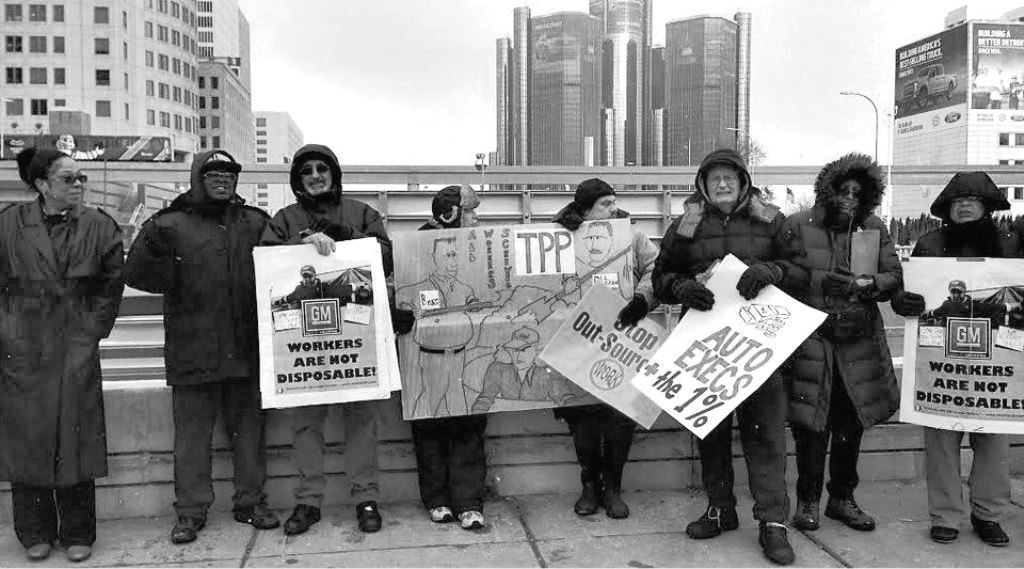

Detroit – General Motors announced Nov. 26 that it plans to slash over 14,000 jobs and close four plants in the U.S., one in Canada and two more in as yet unnamed locations.
GM CEO Mary Barra, who earned $22 million last year, chose her words carefully when she revealed the plan. She said that at various times next year the plants would become “unallocated.” That meant the products currently built at the plant will be discontinued, and no new products will be allocated to the plants named in the announcement.
Barra avoided saying the words “closed” or “idled.” The current contract between GM and the United Auto Workers states: “[T]he Company will not close, idle, nor partially or wholly sell, spin-off, split-off, consolidate or otherwise dispose of in any form, any plant, asset, or business unit of any type.”
The UAW has rejected GM’s doublespeak. Any plant closing or idling — regardless of word choice — violates the current contract, which does not expire until September 2019.
UAW International President Gary Jones blasted GM’s “callous decision,” stating: “The UAW and our members will confront this decision by GM through every legal, contractual and collective bargaining avenue open to our membership.” (The Hill, Dec. 6) Members, allies and other unions are being asked to write letters to the company opposing the closings.
GM claims the cuts are essential because there are more plants than the company needs for the current vehicle market and many plants are only running one shift of production. UAW President Jones says this is due to the company’s decisions to shift more and more production to Mexico and other low-wage countries.
However, Jones is taking a limited, nationalistic position on the fight for decent union jobs by demanding “tax and trade laws that reward U.S. investment.” Jones’ statement does not even acknowledge the attack on Canadian GM workers.
The union officialdom is pursuing a narrow, legalistic strategy, combined with a tame tactic of letter writing. What is needed is militant activism.
Wealthy companies routinely violate all kinds of laws — anti-discrimination, the right to organize unions, environmental protections. Only a mass struggle will hold them accountable.
Grassroots activists plan labor-community fightback
The rank-and-file autoworker group Autoworker Caravan held a meeting Dec. 8 in Detroit to strategize against the closings. The meeting opened with a video created by Sean Crawford, who works at the GM Detroit-Hamtramck plant, which is on the chopping block.
Crawford charged that the Michigan cities of Flint, Pontiac and Saginaw
had been “used up and spit out” by GM. He added, “We all know what GM is really after, the only thing they’ve ever been after, more money.” His video ended with a call to “unite across borders to build a movement of working-class people.”
This set the tone for hearing a series of speakers and a lively discussion on why the plant closings are unacceptable and what actions a real fightback might take. Addressing the gathering were Detroit City Council President Emeritus JoAnn Watson; State Representative and State Senator-elect Stephanie Chang; Andy Gooderis, a representative of Congresswoman-elect Rashida Tlaib; UAW Local 909 President Ghana Goodwin-Dye, whose plant in Warren is slated to close; and Jerry Goldberg, representing Moratorium Now! Coalition to Stop Foreclosures, Evictions and Utility Shutoffs.
The meeting was co-chaired by former Local 909 President and Shop Chair Frank Hammer and UAW Local 869 Trustee Martha Grevatt.
The speakers brought out the fact that the plant closings not only violated the contract, but violated terms of state and federal tax breaks that had tied the giveaways to job creation by GM.
There are many alternatives to closing the plants, including retooling them to combat the climate change emergency. Instead of building gas-guzzling trucks, auto workers could be building clean electric vehicles, buses and trains for mass transit as well as solar panels and wind turbines.
The eminent domain laws, which were used in the 1980s to seize and destroy a whole neighborhood so GM could build the Detroit-Hamtramck plant, could be used instead to seize the plant and run it under union-community control.
The group decided to demonstrate outside the annual Detroit auto show in January and to form a contingent in the annual Martin Luther King Day march. The workers also discussed the need to build fightback committees inside the plants.
A solidarity collection netted over $125 for fired, injured GM workers in Colombia who have been fighting for justice since 2011.
The meeting also celebrated the tenth anniversary of Auto Caravan’s inaugural action. The group was founded when it sent a car caravan to Washington, D.C., in 2009 to demand no contract concessions be attached to the terms of the GM and Chrysler bailouts by the U.S. government.
Raposo is a Portuguese Marxist analyst, editor of the web magazine jornalmudardevida.net, where this article…
By Alireza Salehi The following commentary first appeared on the Iranian-based Press TV at tinyurl.com/53hdhskk.…
This is Part Two of a series based on a talk given at a national…
Educators for Palestine released the following news release on July 19, 2025. Washington, D.C. Educators…
On July 17, a court in France ordered the release of Georges Abdallah, a Lebanese…
The following are highlights from a speech given by Yemen’s Ansarallah Commander Sayyed Abdul-Malik Badr…